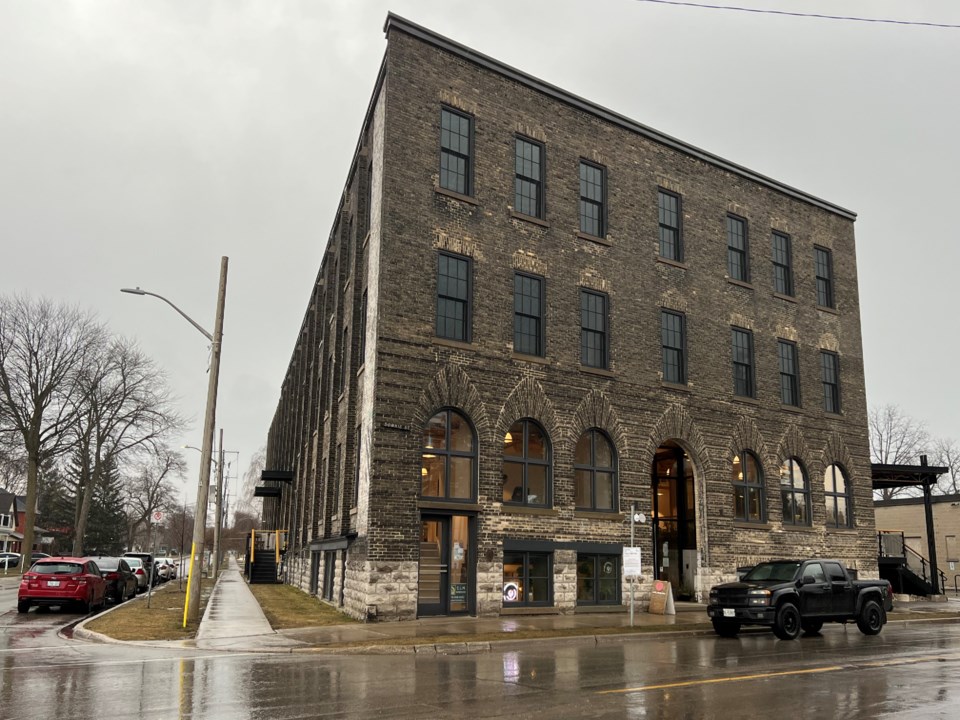A zone change has been approved for The Bradshaw Lofts at 245 Downie St.
Not everyone is happy about that.
The change, approved by Stratford city council, allows all 56 units in the lofts to apply for an inn licence, though council also had to amend the definition of an inn for only this particular property.
Coun. Larry McCabe called the rollout a confusing, “Frankenstein monster.”
“I think we have a very convoluted and restrictive short term accommodations bylaw, which is affecting our ability to make sensible decisions,” McCabe said at a recent city council meeting. “I would have preferred a clearer way of including short term accommodations.”
Under the recently adopted licensing bylaw, the units in the Bradshaw Lofts are unable to be licensed as short-term accommodations, despite the fact that such accommodations have been operating since the building’s 2018 renovation.
That’s because of provisions in the bylaw, such as the stipulation that accommodations are to be operated by the principal resident and that the accommodation shall be an ancillary use.
Allowing the units to apply for an inn licence would allow units to continue having short-term rental accommodations and be above board.
Normally, the definition for an inn includes a provision in its definition pertaining to having a maximum of 10 rooms. For the Bradshaw Lofts, the definition was amended to exclude that provision.
The applicant noted in their zoning amendment request that under the current zoning of the site, an inn is already permitted.
Despite calling the rollout confusing, McCabe supported the solution. He pointed to a closure for renovations at the Queen's Inn this year, saying that Stratford needs more accommodations to support its tourism industry.
Currently, the Bradshaw Lofts are used as both accommodations and as student housing for the Stratford School of Interaction Design and Business.
That will continue with the new amendment. Adam Betteridge, director of building and planning with the city, said that the amendment allows for unit owners to apply for a licence but it does not need to run permanently as an inn.
Occupants may continue to live in it, to rent out the space on the weekends, or to sublet during the school year and operate it as a short term accommodation in the summer, for instance.
Brendan McKenna of The Kressley Group, which manages a number of the accommodators at the Bradshaw Lofts, was at Monday night’s council meeting to answer questions.
He said that currently there are 20 units that have operated as accommodations, though they may not all be active.
McKenna also admitted that the Municipal Accommodations Tax (MAT) was not paid by accommodators at the Bradshaw Lofts this year because they were unable to get licensed.
The MAT is a newly adopted four per cent tax that applies to overnight stays in Stratford. It is to be collected by accommodators and remitted to the city.
As was pointed out by Karmen Krueger, director of corporate services and treasurer, City of Stratford, being unlicenced does not preclude an accommodation from paying the MAT.
Due to a staffing gap in bylaw enforcement, the city emphasized getting the MAT from licensed accommodations while identifying unlicenced accommodations in the first six months of the rollout.
Krueger said that the city is now prepared to move forward with enforcement.
She also said that she suspects retroactively getting the MAT from unlicenced accommodators in that initial six months would not be possible.
Barb Shaughnessy delegated after McKenna, starting off by saying it was difficult to sit through so much misinformation.
She took issue with the assertion that accommodators couldn’t pay MAT because they were unlicenced. All accommodations are required to pay the tax.
Shaughnessy said that she was delegating due to the substance of the amendment and what the Bradshaw Lofts could provide to the city.
“I'm not here as an innkeeper,” Shaughnessy said. “I'm here as a resident who cares about housing. So my concern is the lack of housing for Stratford residents and businesses. The downtown core desperately needs population year-round to keep their businesses going.”
Mike Sullivan, another delegate, said that the decision to make such a change would require a vote of all of the owners, not just the board of directors for the condominium corporation. He warned that if none occurred, that could leave the city liable in any legal action.
Sullivan took issue with the fact that the unlicenced accommodators did not pay MAT this last year.
“You owe a bunch of money for the city, as do a bunch of others,” Sullivan said.
Coun. Geza Wordofa and Coun. Cody Sebben were the only councillors to oppose the amendment (Coun. Lesley Biehn and Coun. Taylor Briscoe were absent).
Coun. Jo-Dee Burbach said that she supported the amendment due to the fact that the design of the building was for students and short term accommodations.
Likewise, Coun. Bonnie Henderson said that she is in support because it has been operating as accommodations since the very beginning.
Coun. Mark Hunter said that he supported the change due to the facts that there is on site security, the condominium documents allow short term accommodations, and there were no complaints made by other unit holders during the public input process.



